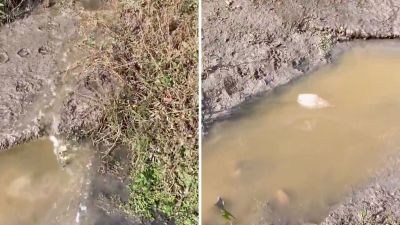Government being sued for allowing water firms to pump sewage into environment

Campaigners and charities say they intend to sue the government for allowing raw sewage to be released into the environment.
The Marine Conservation Society has filed a judicial review against the Department for the Environment, Food and Rural Affairs (DEFRA) in a bid to protect waters from sewage dumping.
The non-profit has joined the case as a co-claimant along with Wiltshire-based charity WildFish, Richard Haward’s Oysters and Hugo Tagholm, the former CEO of St Agnes charity, Surfers Against Sewage (SAS).
The legal challenge has been launched by not-for-profit organisation the Good Law Project.
The group hope to force the government to rewrite its Storm Overflows Discharge Reduction Plan 2022 so that it includes many coastal waters that they believe are currently almost entirely excluded.
They also hope the suit will mean the government must impose tighter deadlines on water companies, limiting the amount of sewage that can be released.
Sandy Luk, CEO of the Marine Conservation Society, said: “Untreated sewage is being pumped into our seas for hundreds of thousands of hours each year, putting people, planet and wildlife at risk.
"We’ve tried tirelessly to influence the UK Government on what needs to be done, but their plan to address this deluge of pollution entering our seas is still unacceptable.
"We owe it to our members, supporters and coastal communities to act, which is why we’ve joined as co-claimants on this case. We’re out of options. Our seas deserve better."
'We need urgent action now - not in 28 years'
WildFish, who's headquarters is in Salisbury, is arguing that DEFRAs existing plan is unlawful as it approves continuing unlawful conduct, fails to take into account the existing law, breaches the Habitats Regulations, and is irrational.
In a tweet, it said: "Government's plan to deal with sewage pollution fails to address the cause of the problem. It is also confusing and contradictory and sets targets as far ahead as 2050.
"We need urgent action now to #EndSewagePollution - not in 28 years' time."
The charity has instructed leading environmental barrister James Maurici KC, Charles Bishop of Landmark Chambers, and Fieldfisher LLP, to bring the challenge.
Nick Measham, CEO of WildFish, added: "Years of underinvestment and absent regulators have got us where we are today with widespread illegal sewage discharges.
"If DEFRA's plan is intended to deal with illegal discharges, it is unlawfully encouraging law-breaking for years to come. If it is not intended to deal with these illegal discharges, it is irrelevant."
The Good Law Project has said that suing the government is necessary to protect the UK's waters and tackle the risk both to humans and the environment.
Emma Dearnaley, legal director at the organisation, said: "These sewage spills are threatening human health, biodiverse marine life and the fishing industry. We believe that taking legal action now is vital to help safeguard our coastal waters for generations to come."
Emma added that the organisation will "work closely with the claimants" to "put forward the case for more ambitious and urgent measures to reduce sewage discharges by water companies."
The impact of sewage in Cornwall
Cornwall has been particularly affected by water companies discharging sewage into rivers and the sea.
The county has received one of the largest numbers of serious reported pollution incidents from crude and storm sewage in England since 2019, according to Government data.
According to SAS's latest Water Quality Report, South West Water (SWW) was responsible for a total of 1,990 hours of sewage being pumped into the sea at beaches across the region during the 2022 season.
That report states this makes the water company the second-worst offender for discharges this season, behind United Utilities in the North West, which was responsible for 10,020 hours of sewage being dumped into bathing waters.
The group also found there were 146 dry spells detected over a 12-month period, with 95 of these being at locations where water quality is classified as "excellent".
'We recognise there is more to do' - South West Water
Responding to the legal suit launched by the group, a spokesperson for DEFRA said they could not comment on ongoing or prospective legal proceedings.
However, the spokesperson pointed out that the government's Storm Overflows Discharge Reduction Plan will require water companies to spend around £56bn in investment over the next 25 years, the largest infrastructure programme in the industry's history.
They added DEFRA is trying to balance ambition with impact on consumer bills in the plan and will review the strategy in 2027, to see if targets can be accelerated without overburdening taxpayers.
A spokesperson for South West Water also commented, saying: "We have been working hard to reduce the impact of storm overflows and in this year’s bathing season we have reduced spills by 50% on last year, with a 75% reduction in duration, across our 860 miles of coastline. However, we recognise there is more to do.
“Our largest environmental investment programme in 15 years, WaterFit, is well underway, focused on delivering benefits for customers, communities and the environment.
"This year, for the first time, 100% of the classified bathing waters in the South West passed stringent standards, with 98% rated as or ‘Good’ or ‘Excellent’, compared to c.28% in 1991 and we are delivering improvements to maintain and further improve our region’s excellent bathing water quality all year round.”